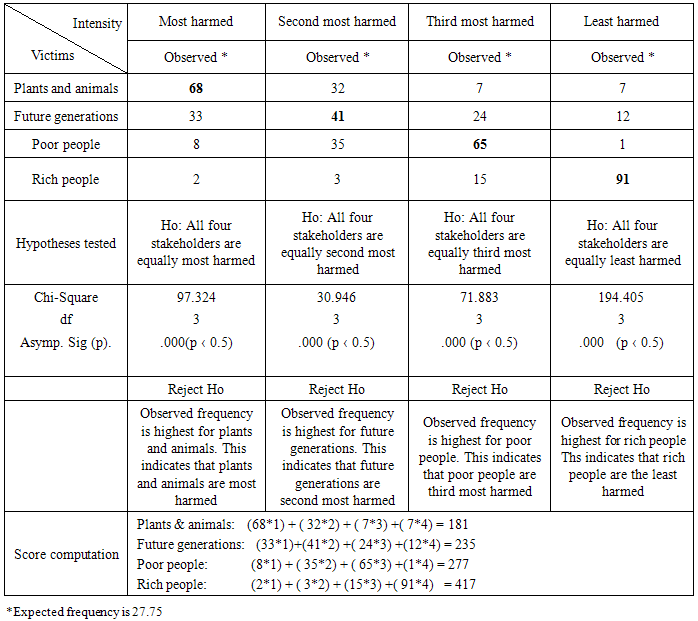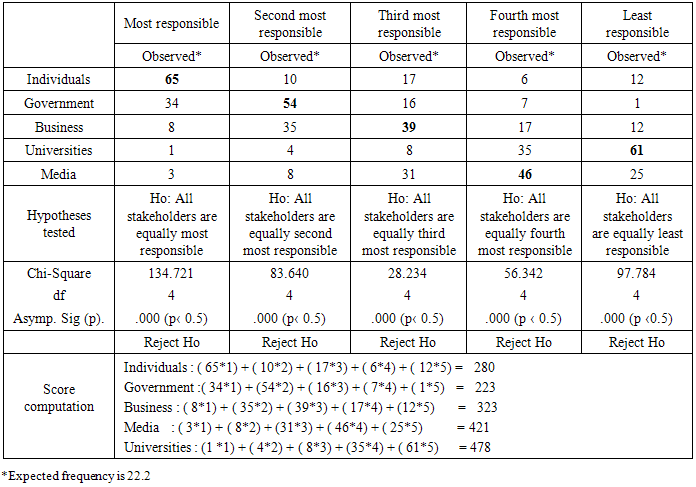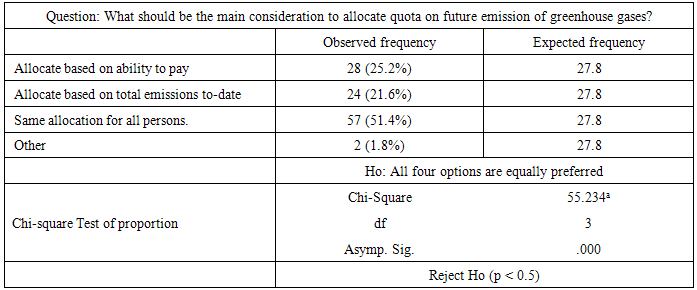-
Paper Information
- Next Paper
- Previous Paper
- Paper Submission
-
Journal Information
- About This Journal
- Editorial Board
- Current Issue
- Archive
- Author Guidelines
- Contact Us
American Journal of Economics
p-ISSN: 2166-4951 e-ISSN: 2166-496X
2015; 5(2): 189-193
doi:10.5923/c.economics.201501.23
Ethics and Global Climate Change: Voices of the Young
Yen Wan Chong, Saari Ahmad
Department of Business Management, Universiti Utara Malaysia
Correspondence to: Yen Wan Chong, Department of Business Management, Universiti Utara Malaysia.
| Email: |  |
Copyright © 2015 Scientific & Academic Publishing. All Rights Reserved.
Climate change is a most important issue facing the world today that requires urgent international co-operation. Despite the seriousness of the issue, very little concrete global action has been taken as of to-date to address climate change. The business and social sciences need to play a more active role to complement the natural sciences to tackle the climate change problem. Climate change is not only a technological issue but is also an ethical and business sustainability issue. It is important to create awareness and include all stakeholders including young people in discussions on climate change policy formulation as emissions of the current generation will cause problems for future generations. This study employed a mixed method approach to engage business under-graduates and examine their views on climate change responsibility and the ethical dimension of climate change mitigation issues.
Keywords: Climate change, Climate responsibility, Distributive justice, Business ethics
Cite this paper: Yen Wan Chong, Saari Ahmad, Ethics and Global Climate Change: Voices of the Young, American Journal of Economics, Vol. 5 No. 2, 2015, pp. 189-193. doi: 10.5923/c.economics.201501.23.
Article Outline
1. Introduction
- Climate change is among the most important issues facing the world today. For a seemingly very long time, the climate change discourse has been rather narrow, focussing on the assessment of technological evidence to confirm the occurrence of human induced climate change. In recent years, a consensus has been reached in the global scientific community that global climate change (GCC) is indeed occurring. Nearly all climate scientists, estimated at 97%, are convinced that human-caused or anthropogenic climate change is indeed occurring [1]. Since the existence of anthropogenic climate change has been confirmed, it is important now to focus on measures that should be undertaken to halt human induced climate change. Global action to address climate change is important as the dangerous consequences due to climate change are projected to get much worse in the decades to come [2]. Despite the seriousness of the issue, very little concrete global action has been taken as of to-date to address climate change. Climate change is a complex issue which involves not only technological and economic considerations but also has ethical or moral dimensions which are often overlooked ([3], [4]). Climate change is also an ethical issue as emissions of the current generation cause problems for future generations, and richer countries emit more greenhouse gasses while poorer countries will suffer more damage [5].
1.1. Motivation of the Study
- Although efforts are made to ensure that the views of all stakeholders of climate change are taken into account, not all stakeholders are adequately represented in discussions on climate change mitigation policy design. While some stakeholders such as the fossil energy business sector may be over represented [6], other stakeholders such as the poor, rural communities, women and young people appear to be under-represented in climate change decision-making fora. Procedural justice requires that the views of all stakeholders particularly those who are most impacted by climate change to be taken into account in climate change policy formulation. This study aims to examine the views of young adults on issues related to climate change responsibility and climate change mitigation measures.
2. Methodology
- This study employed a combination of quantitative and qualitative approaches in order to achieve a better understanding of the perceptions of business undergraduates on the moral dimensions of climate change. The data presented in this paper is part of a larger study aimed to gain insights on the dominant ethical orientations employed by business undergraduates when considering important climate change issues, i.e whether their moral reasoning are based on religious ethics, utilitarianism, ethics of care, virtue ethics, principles of justice or moral rights considerations. The research instrument was a self-administered survey questionnaire containing open-ended and close-ended questions. Valid responses were obtained from 111 business undergraduates enrolled in a business ethics course at a public university in Malaysia which specializes in management education. The profile of the respondents are presented in table 1.
|
3. Results
- The results of four research questions are presented in this section. The data was coded and analyzed using SPSS. The Chi-square test for proportion was used as test of statistical significance. The Chi-square (χ2) test was used to test hypotheses Ho for equal proportion.
3.1. Climate Change Victims
- The results on the following close ended research question are presented in table 2. • Which party is MOST HARMED by climate change?• Which party is SECOND MOST harmed by climate change?• Which party is THIRD HARMED by climate change?• Which party is LEAST HARMED by climate change?For each of the above questions respondents were given four options as follows:• Plants and animals • Future generations• Poor people• Rich people
|
3.2. Climate Change Responsibility
- The results on the following close ended research question are presented in table 3.
|
3.3. Funding Climate Change Mitigation
- The result on the following close ended research question is presented in table 4. • Who should pay the cost of climate change mitigation?
|
3.4. Allocation of Greenhouse Gasses Emission Quotas
- The result on the following close ended research question is presented in table 5. • Which the best method to allocate quota on future emission of greenhouse gases?For the above question respondents were given four options as follows: • Allocate based on ability to pay• Allocate based on past/total emissions to-date • Same allocation for all persons• Other
|
4. Conclusions
- This study provided some insights on the views of young adults in a developing nation on climate change responsibility and mitigation issues. While procedural justice requires the participation of all stakeholders particularly those who are most impacted by climate change, it has been difficult for under-represented stakeholders such as indigenous and young people in developing countries to participate in climate change mitigation policy discussions due to capacity, time and resource constraints. There is a need for creating greater awareness among under-represented stakeholders and holding more inclusive discussions on climate change policies. The business and social sciences need to play a more active role in providing insights on the social dimensions of societal response and adaption on climate change mitigation issues [7].
 Abstract
Abstract Reference
Reference Full-Text PDF
Full-Text PDF Full-text HTML
Full-text HTML



